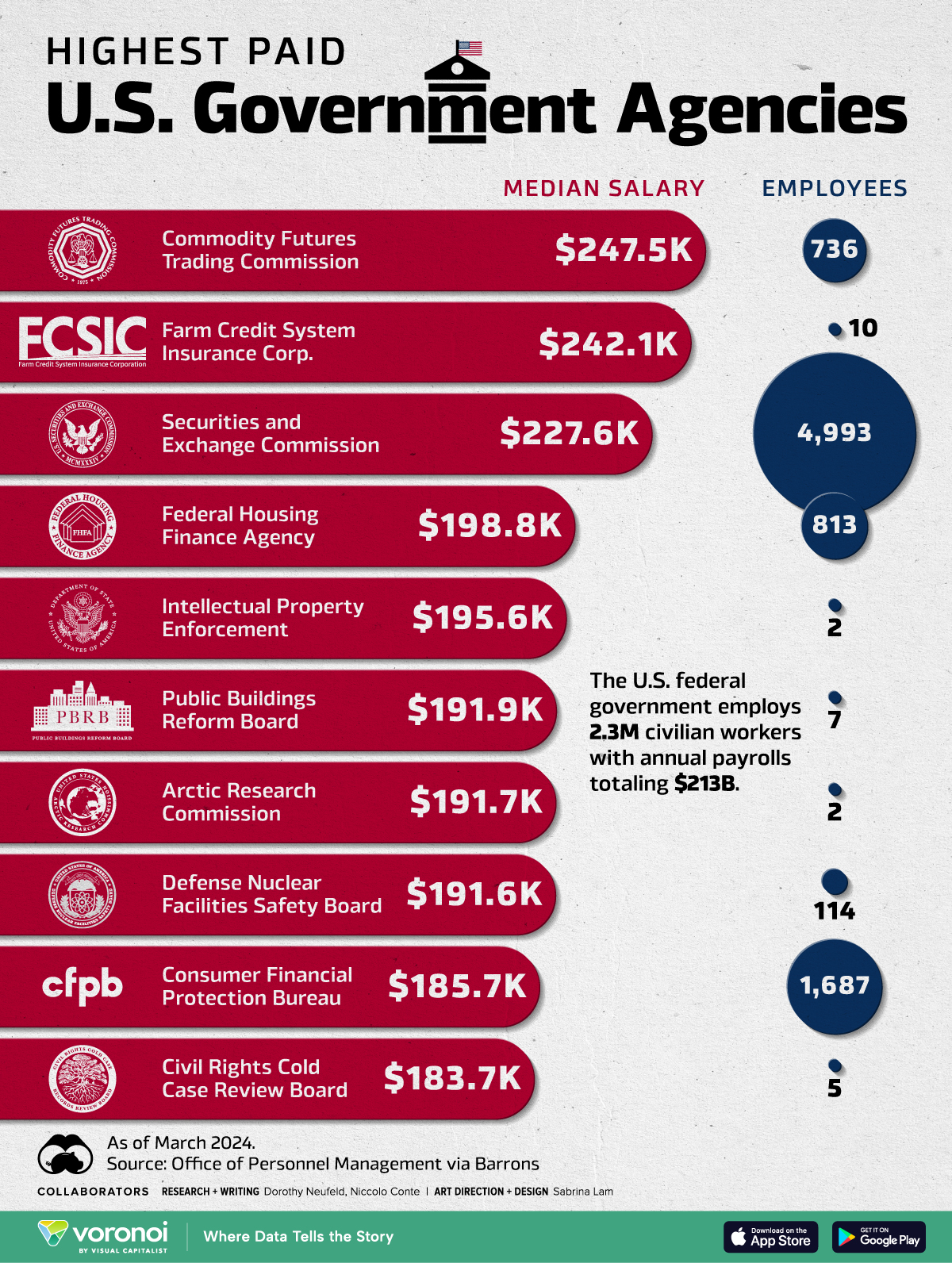U.S. Government Agencies with the Highest Paid Employees
This was originally posted on our Voronoi app. Download the app for free on iOS or Android and discover incredible data-driven charts from a variety of trusted sources.
Today, some of the highest paid U.S. federal agencies are financial regulators overseeing multi-trillion dollar asset markets.
While the median pay for federal workers is $99,000, wide variations exist across 438 agencies and sub-agencies. Employees at the Commodity Futures Trading Commission (CFTC) have a median pay of $247,518 while employees working for Veterans Affairs and the Treasury Department are paid among the lowest.
This graphic shows the highest paid U.S. government agencies, based on data from the Office of Personnel Management via Barrons.
Top 10 Federal Agencies by Median Pay
Below, we show the highest paying federal government agencies as of March 2024:
| Rank | Federal Agency | Median Salary | Employees |
|---|---|---|---|
| 1 | Commodity Futures Trading Commission | $247,518 | 736 |
| 2 | Farm Credit System Insurance Corp. | $242,124 | 10 |
| 3 | Securities and Exchange Commission | $227,571 | 4,993 |
| 4 | Federal Housing Finance Agency | $198,819 | 813 |
| 5 | Intellectual Property Enforcement | $195,600 | 2 |
| 6 | Public Buildings Reform Board | $191,900 | 7 |
| 7 | Arctic Research Commission | $191,724 | 2 |
| 8 | Defense Nuclear Facilities Safety Board | $191,595 | 114 |
| 9 | Consumer Financial Protection Bureau | $185,654 | 1,687 |
| 10 | Civil Rights Cold Case Review Board | $183,656 | 5 |
Ranking in first is the CFTC, largely composed of attorneys, economists, and auditors.
The agency, with 736 staff, oversees the swaps market worth $400 trillion in notional value, along with commodity and Treasury futures, among other derivatives. Similarly, the Securities and Exchange Commission, which regulates stock exchanges and financial advisors, pays upwards of $227,000.
Following next is the Farm Credit System Insurance Corporation, an agency of 10 people that ensure the repayment of agricultural loans issued by Farm Credit System banks. As of the third quarter of 2024, gross loans from these banks totaled $414.4 billion.
In some cases, federal agencies will pay a higher rate to remain competitive with the private sector. Yet as a whole, civil workers with advanced degrees earn up to 22% less than comparable corporate roles.
Top 10 Lowest Paid Government Agencies
On the flip side, here are the agencies at the bottom end of the federal pay scale:
| Rank | Federal Agency | Median Salary | Employees |
|---|---|---|---|
| 1 | Armed Forces Retirement Home | $60,465 | 306 |
| 2 | Economic Advisors Council | $64,239 | 23 |
| 3 | International Boundary & Water Commission | $70,061 | 256 |
| 4 | National Archives & Records Administration | $75,980 | 2,800 |
| 5 | Treasury Department | $76,778 | 108,869 |
| 6 | Agriculture Department | $77,955 | 92,072 |
| 7 | Small Business Administration | $80,006 | 7,925 |
| 8 | Interior Department | $87,878 | 62,890 |
| 9 | Veterans Affairs Department | $89,092 | 486,522 |
| 10 | Navajo & Hopi Indian Relocation Office | $89,318 | 18 |
The Armed Forces Retirement Home, which runs two retirement homes in Washington D.C. and Mississippi, pays the lowest.
Additionally, median pay for workers at the Veterans Affairs Department, ranks among the bottom 10. With a staff of 486,522, the agency employs about a fifth of the U.S. federal workforce, responsible for providing compensation, health care, and home loan guarantees to veterans.
As we can see, median pay at the Treasury Department is $76,778, the fifth-lowest overall. According to Indeed, a tax examiner earns on average $44,065 per year while a tax specialist earns $105,711.
Looking ahead, the civil-servant workforce could see sharp reductions with the newly-created Department of Government Efficiency, where Elon Musk has proposed eliminating the Consumer Financial Protection Bureau, the Education Department, in addition to other sweeping job cuts. This comes at a time of record public debt and an expanding fiscal deficit.
However, proposed spending cuts are expected to encounter significant resistance from Congress and unions, given that federal employees are rarely terminated and operate under binding agreements.
Learn More on the Voronoi App 
To learn more about this topic from a corporate perspective, check out this graphic showing the top companies receiving the most subsidies since 2000.

